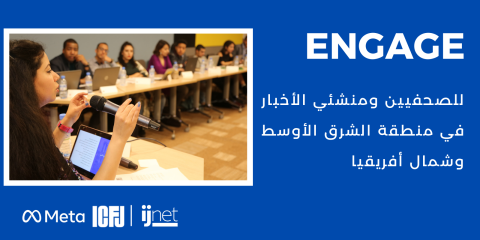
Arabic-speaking journalists and content creators have the opportunity to sharpen their digital skills in storytelling, video reporting, data journalism, and audience development with “Engage,” an initiative from the International Center for Journalists (ICFJ) in partnership with the Meta Journalism Project.
“Engage” will offer eight expert-led Arabic-language sessions, each followed by a Q&A session. In addition, 20 participants will receive grants and mentorship to pursue reporting projects that build on the lessons learned. The training will be live streamed through the Meta Journalism Project‘s vibrant Facebook group, which has brought together more than 2,400 Arabic-speaking journalists.
Register your interest here to receive information on upcoming trainings. Subscribe here to get the latest on forthcoming webinars in Arabic.
“Engage” replaces the “Social Media Solutions Program,” which reached more than 11,000 journalists between 2019 and 2021, in a region facing serious challenges on a host of fronts.
“We have been amazed by the incredible interest among MENA journalists in the ICFJ network for this kind of training and support,” said Aliza Appelbaum, ICFJ deputy vice president of programs. “Thousands of reporters have taken part so far. At a time when disinformation is a growing threat, they are ensuring that their communities are better informed.”
“We are excited to yet again partner with ICFJ to raise the bar for quality news and creator content even higher,” said Mohamed Omar, Strategic Partner Manager, News Partnerships in MENA.“Today, it is vital to possess advanced storytelling, video and data skills to be able to deliver stories that matter. As social media has fundamentally changed the way we consume information, our goal is to teach publishers the best practices and ensure a strong and profitable news industry.”
Impact
The earlier editions of the program offered a total of 62 online courses, in addition to in-person trainings in Jordan, Lebanon, Morocco and Tunisia that drew about 800 attendees. ICFJ also funded 49 reporting grants. Each grantee benefited from specialized mentoring and guidance for approximately six weeks. Participants were awarded grants ranging from $1,500-$2,500 to help them produce stories using their improved knowledge and skills.
“My participation in a series of intensive trainings since 2020 allowed me to enhance my journalism skills,” said Sabri Abdelhak, a journalist in Morocco and founder of “True Story.” “In addition, the grants and mentoring program enabled me to produce two investigative stories. Following this, I have founded a media platform using my updated skills and new experiences provided by ICFJ’s program.”
In 2021, 4,282 journalists from the MENA region and beyond attended virtual trainings organized by ICFJ. Others watched on Facebook Live, with a combined "reach" of 73,500. The 24 virtual training sessions covered four main areas: safety and digital security verification, fact-checking, audience engagement strategies, and digital storytelling techniques. The attendees joined from over 50 countries, with the highest from Egypt, Morocco, Yemen, Syria, Tunisia, Turkey, Iraq, Jordan, Lebanon, and Algeria, on IJNet Arabic's Facebook Live.
About the International Center for Journalists (ICFJ)
The International Center for Journalists (ICFJ) empowers a global network of journalists to produce news reports that lead to better governments, stronger economies, more vibrant societies, and healthier lives. We serve our community by providing training, mentoring, fellowships, and financial support in investigative journalism, critical-issues reporting, media innovation, and financial sustainability through cutting-edge research and resources. Learn more at icfj.org.
About Meta Journalism Project
The Meta Journalism Project works with publishers around the world to strengthen the connection between journalists and the communities they serve. It also helps address the news industry's core business challenges. Our trainings, programs, and partnerships work in three ways: 1. Building community through news by working with and investing in organizations that fund quality journalism; 2. Training newsrooms globally; and 3. Partnering with news publishers and nonprofits to combat misinformation, promote news literacy, fund new initiatives, share best practices, and improve journalism on our platforms. For more information, please visit facebook.com/journalismproject.